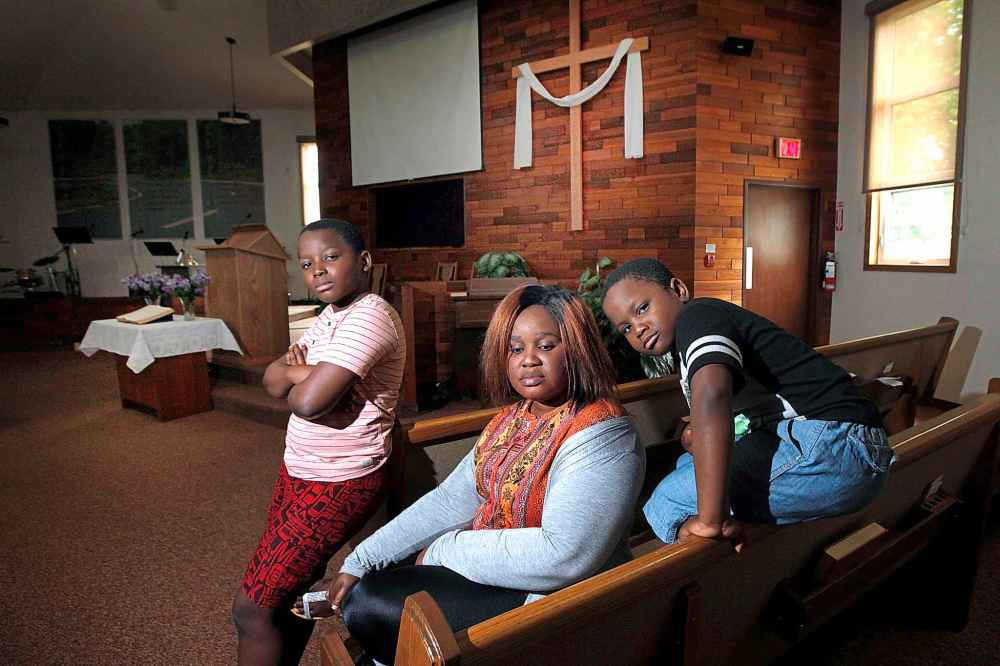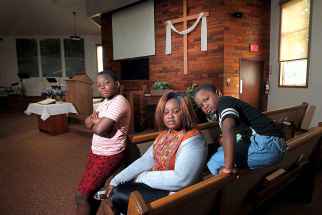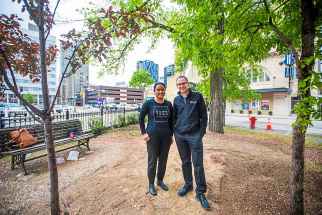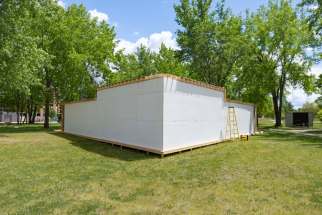Ancient practice of sanctuary challenges modern participants
Read this article for free:
or
Already have an account? Log in here »
To continue reading, please subscribe:
Monthly Digital Subscription
$0 for the first 4 weeks*
- Enjoy unlimited reading on winnipegfreepress.com
- Read the E-Edition, our digital replica newspaper
- Access News Break, our award-winning app
- Play interactive puzzles
*No charge for 4 weeks then price increases to the regular rate of $19.00 plus GST every four weeks. Offer available to new and qualified returning subscribers only. Cancel any time.
Monthly Digital Subscription
$4.75/week*
- Enjoy unlimited reading on winnipegfreepress.com
- Read the E-Edition, our digital replica newspaper
- Access News Break, our award-winning app
- Play interactive puzzles
*Billed as $19 plus GST every four weeks. Cancel any time.
To continue reading, please subscribe:
Add Free Press access to your Brandon Sun subscription for only an additional
$1 for the first 4 weeks*
*Your next subscription payment will increase by $1.00 and you will be charged $16.99 plus GST for four weeks. After four weeks, your payment will increase to $23.99 plus GST every four weeks.
Read unlimited articles for free today:
or
Already have an account? Log in here »
Hey there, time traveller!
This article was published 17/06/2019 (2367 days ago), so information in it may no longer be current.
Two months into living in a church basement to avoid deportation, Fatmata Kargbo faces the mixed blessing of residing in Canada while not able to enjoy the advantages of this country.
“We have good people taking care of my boys and doing all these things, but we don’t have the freedom to go outside,” she says from the lobby of west Winnipeg church on a beautiful June morning.
Housed at Crestview Fellowship Church on Hamilton Avenue since April 11, the woman from Freetown, Sierra Leone, is now part of a long tradition of people seeking sanctuary in religious spaces.
Based on the sanctuary cities found in the Book of Numbers in the Jewish and Christian scriptures, the modern concept of sanctuary provides a safe place in a house of worship for an individual or family facing deportation and the threat of danger in their home country
Sanctuary provides temporary safety, but it also carries high personal costs from being confined indoors for months at a time, says a Toronto minister whose church sheltered a family of three for 18 months. That family finally received their permanent residency and still lives in Toronto.
Before opening the door
Offering sanctuary to strangers facing deportation can be life-giving for both the visitor and the hosts, but only if everyone has done their homework, says a member of Canadian Sanctuary Network.
“Sanctuary is a last resort when an individual or a family has gone through the process and something has gone wrong,” said Rev. Alexa Gilmour of Windermere United Church in Toronto, which hosted a family of three for 18 months.
Before taking someone in, a religious group needs assessing whether the refugee has a criminal record, has a solid case for appeal, and can withstand being cooped up inside for months, even years.
Offering sanctuary to strangers facing deportation can be life-giving for both the visitor and the hosts, but only if everyone has done their homework, says a member of Canadian Sanctuary Network.
“Sanctuary is a last resort when an individual or a family has gone through the process and something has gone wrong,” said Rev. Alexa Gilmour of Windermere United Church in Toronto, which hosted a family of three for 18 months.
Before taking someone in, a religious group needs assessing whether the refugee has a criminal record, has a solid case for appeal, and can withstand being cooped up inside for months, even years.
“The day-to-day is very wearing, depending on what you’re heard from the lawyer recently or what the mood of the family is,” Gilmour said in a telephone interview.
She said the congregation also needs to ensure they have enough volunteers and money to support the person in sanctuary for months. Groups considering providing sanctuary can check out the online resources at www.sanctuarycanada.ca
Winnipeg’s Crescent Fort Rouge United Church housed the eight members of the Raza family for 18 months, from August 2006 to February 2008 when they were facing deportation to Pakistan, the birthplace of the parents and their two oldest children. Two of the six children were born in Canada, and the rest of the family because permanent residents in 2011.
In medieval times in Europe, people fleeing justice or money lenders could find sanctuary in a church, chapel or other sacred space. In Canada and North America, the concept of sanctuary has stretched to include housing refugees fearing deportation and the threat of violence or death in the home country.
Sanctuary is not part of Canadian law, but traditionally government authorities have respected the concept of sanctuary and do not enter religious buildings where refugees are housed.
Congregations providing sanctuary see the practice as an expression of their faith by loving their neighbours and extending compassion to them, said Gilmour.
“There is a profound blessing even as one is blessing another by saving their lives,” she said.
She fears there will be greater demand for the practice as attitudes harden toward refugees, already evident in Ontario where the recent budget cut legal aid for refugees.
“In Canada, I have a concern that the need for sanctuary will increase as the rhetoric around refugees becomes more negative and divisive,” said Gilmour.
— Suderman
“As wonderful as a church, temple, synagogue or mosque may be, you’re still lacking in the freedom to come and go,” Rev. Alexa Gilmour of Windermere United Church said in a telephone interview.
“It has profound psychological impacts.”
In medieval times, people in trouble with the law or money lenders were safe from arrest if they sought sanctuary in churches, chapels or monasteries. In North America, the practice was picked up in the 19th century when churches housed people escaping slavery or civil conflict, explained Saulo Padillo, immigration coordinator for Mennonite Central Committee, based in Goshen, Ind.
“Here in the United States there is a long history, like the Underground Railroad and in the 1980s churches were providing sanctuary to a lot of Central American refugees from El Salvador and Guatemala on their way to Canada,” Padillo said in a telephone interview.
More than 800 American churches are now part of the New Sanctuary Movement, willing to providing sanctuary to some of the millions of undocumented people in the United States facing deportation.
Gilmour said religious groups must view sanctuary as a stop gap solution that can offer breathing space to refugees while other legal measures can be worked out.
“Sanctuary is not a golden ticket to citizenship in Canada,” said Gilmour, a member of the Canadian Sanctuary Network.
“It’s a second chance when the system has failed.”
She said refugees who sought sanctuary have had their previous applications denied because they had little or no legal representation, and no money to pay for lawyers.
“Sanctuary is not a golden ticket to citizenship in Canada…it’s a second chance when the system has failed.” – Rev. Alexa Gilmour of Windermere United Church
That was the case for Kargbo, 41, who now has a lawyer hired by the church. She and her sons have attended Crestview Fellowship Church for the past two years, but she only disclosed her immigration problems to them recently.
Two hours before she was scheduled to appear at the airport on April 11 to be deported to Sierra Leone, the church agreed to Kargbo’s request to take in her family, said Darrel Guenther, minister of the Mennonite congregation of about 60 people.

Church members converted three basement rooms into a makeshift apartment, installed a shower, and signed up to make meals, buy groceries, and deal with legal issues, Guenther said. They also provide volunteer tutors for 12-year-old Thaduba and Mathebeh, 6, who left their public school in April.
“It’s been really, really, good to see how the congregation has rallied around this,” Guenther said about the 20 volunteers involved in sheltering the family.
Kargbo came to Canada with her former husband and their sons three years ago to attend a friend’s wedding. Her husband returned to Sierra Leone, divorced her, remarried, and took over the family home.
In Winnipeg she lived in a basement apartment in the Crestview neighbourhood and worked in a hotel while attempting to gain permanent residency in Canada.
“When I came to Canada, I realized there was more safety here for my kids and for my own safety,” she said, adding her 21-year-old daughter remains in Sierra Leone.
She fears her sons will be abducted and initiated into a men’s secret society associated with witchcraft whose initiation rituals result in permanent scars and resistance can lead to death.
“Back home, if you don’t have money, you don’t have safety,” she said.
For now, Kargbo is safe, but the stress of staying inside is already evident. Sometimes she sits in the church doorway to take in the sun or the spring breeze, but she knows she won’t be able to step outside the building for months until her appeal is heard.
“I don’t want to think about the time,” she said.
“I’m just thinking God will do something before that.”
brenda@suderman.com
The Free Press is committed to covering faith in Manitoba. If you appreciate that coverage, help us do more! Your contribution of $10, $25 or more will allow us to deepen our reporting about faith in the province. Thanks! BECOME A FAITH JOURNALISM SUPPORTER

Brenda Suderman has been a columnist in the Saturday paper since 2000, first writing about family entertainment, and about faith and religion since 2006.
Our newsroom depends on a growing audience of readers to power our journalism. If you are not a paid reader, please consider becoming a subscriber.
Our newsroom depends on its audience of readers to power our journalism. Thank you for your support.
History
Updated on Monday, June 17, 2019 7:12 PM CDT: Fixes typo in photo caption.
The Free Press acknowledges the financial support it receives from members of the city’s faith community, which makes our coverage of religion possible.










